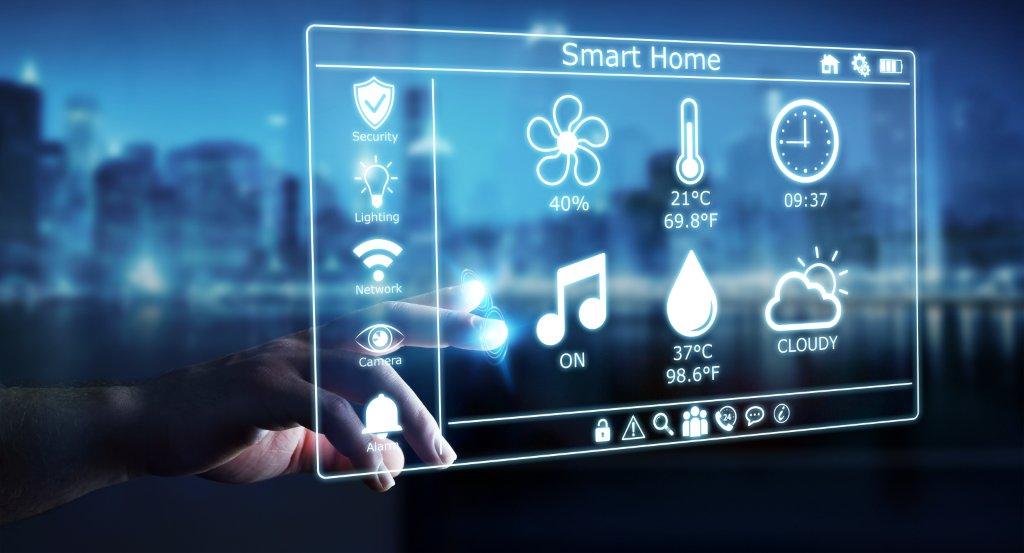
How quickly have we become accustomed to new technology? In 1967, the “house of the future” – built in Disneyland, California – featured such unimaginable innovations as dishwashers, microwaves and air-conditioning. Now, most of us would never dream of living in a home without such basic essentials.
In 2017, the modern home is littered with voice-controlled gadgets and appliances, from smart lighting systems and curtain controls, to connected TVs, intelligent coffee machines and even smart pet food dispensers.
The modern refrigerator, for example, has smart food storage facilities with built-in ergonomic and environmental efficiency. It is built of energy-optimising materials and will be virtually self-sufficient in terms of power usage. Soon, we will be able to communicate with it, getting instructions on when the milk in the fridge is due to expire and text messages asking us to grab a box of eggs on the way home. One day, it may even tell us when the dog should be walked – though the family pet will probably have its own automated treadmill by then.
The pace of technological change is relentless. We are living at the start of what Professor Klaus Schwab, founder of the World Economic Forum, calls the “fourth industrial revolution”, in which artificial intelligence, robotics, virtual reality and biotechnology come together to effect change as profound as the preceding industrial, electronics and computer revolutions.
Maybe the most impactful aspect of this so far – and we are still in the early stages of the transformation – is the revolution in communications. There are now some three billion people connected on the planet by mobile technology, nearly half the entire world population. By 2020 – not so long away – it has been estimated that there will be 20 billion “connected” devices, each with enough computer power to function and make controlled decisions on their own.
The internet of people will be overtaken by the Internet of Things.
Smart homes will become part of a network of smart cities. Dubai has already declared its ambition to become one of the smartest cities of the twenty-first century, and is well advanced on its way to achieving that. Transactions which previously required paper, documents and ink stamps are already being executed online without delay.
By 2050, it’s possible to imagine a world in which boundaries of geography and distance have been made meaningless by a global network of virtual reality travel and ultra-fast transportation, such as the hyper-loop system under consideration in the UAE. Retailing will already have been revolutionised by aerial drone delivery systems, thanks to retail pioneers like Amazon, or replaced by on-demand 3D printing systems in the convenience of your own home. Industrial and commercial supply chains will have been revolutionised by the same 3D technology.
The implications for a business like DAMAC will be enormous, but we are still only at the start of it, because these are only the innovations we can already envisage. Disney itself could not even imagine a smart fridge. What are the “unknown unknowns” out there that will become standard in thirty years?
We should remember too that it is not always the most complex or sophisticated technology that has the biggest impact on our way of life. The economist Tim Harford, writing recently in the Financial Times, argued that three basic innovations – paper production, barbed wire and containerization – had as much effect on society as any nano invention we might imagine. Each revolutionised a specific sector – communications, agriculture and commerce – in a profound and permanent way.
What are the new innovations that might disrupt and transform the way we live and the places we live in?
We have already touched on some of them. The impact of built-in responsive technology, prefabrication and 3D printing has already been felt in the construction industry. Supply chains will be further shortened by new logistical and transportation techniques, with profound effects on the economics of the industry, as we are acutely aware at DAMAC.
Our way of life will be affected as consumers, but also as producers. Robotics, artificial intelligence and automation will remove many of the mundane and needless tasks we currently have to perform, and will – in theory – extend and enrich our leisure hours to more meaningful and fulfilling pursuits. If you do not have to wash the dishes or fire up the boiler, you can dabble in a little art, or spend more quality time with your children.
The Fourth Industrial Revolution promises to enrich our lives, but it also threatens to take away the means of livelihood of many millions of people whose subsistence depends on performing, for payment, the very mundane task we wish to avoid. People living in emerging markets are most vulnerable to the changes the revolution might bring, Professor Schwab has warned.
So, while the age of machines should be welcomed as a new era of human development, we should also ensure that it is managed by human beings, and subordinated to their needs at every stage of the transformation.